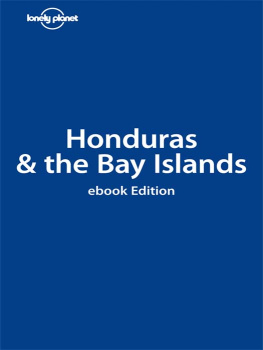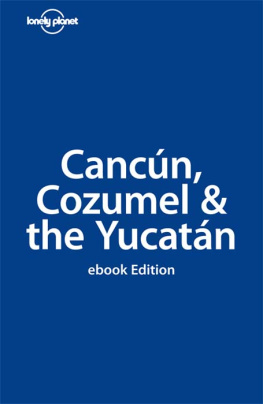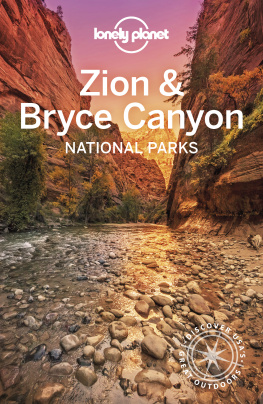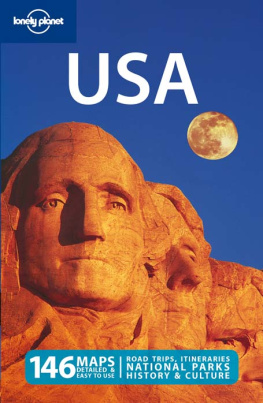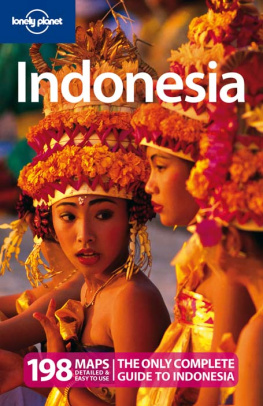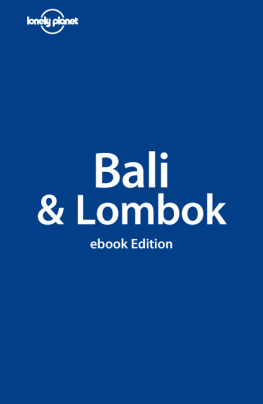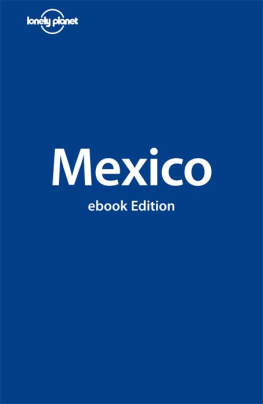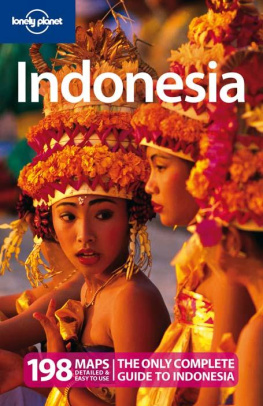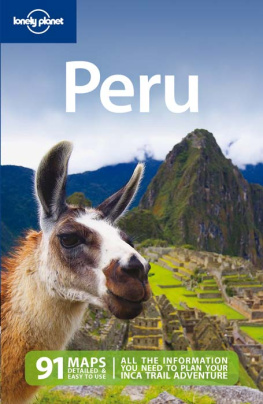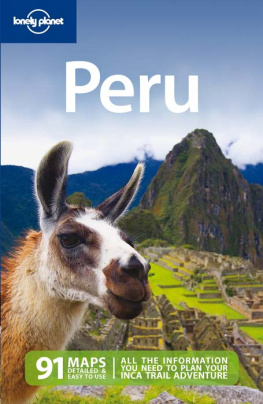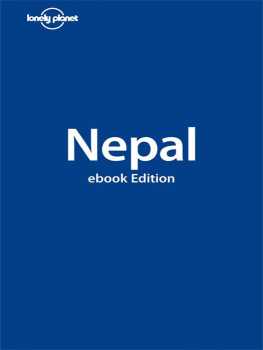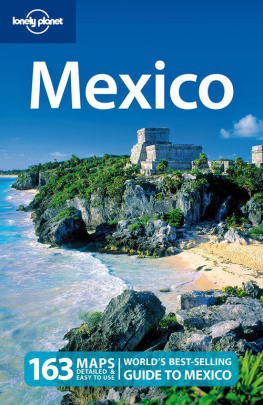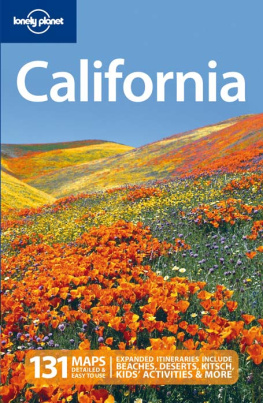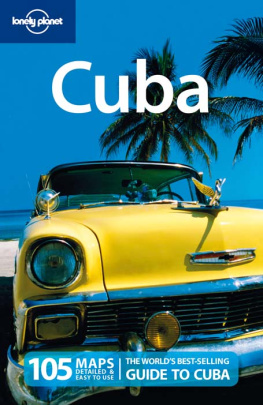
Destination Honduras
The face of a nation changed forever on June 28, 2009, when a military coup removed Honduran President Manuel Zelaya from power. But the Honduran people are strong.
FAST FACTS
Population: 7.79 million
Life expectancy: 67.8 (men), 71 (women)
Population growth: 1.956%
Type of government: Democratic Constitutional Republic
Dominant religions: Roman Catholic (97%), Protestant (3%)
Literacy rate: 80%
GDP per person: US$4400 (US$46,000 per person in the US)
Urbanization 2.9% annual growth (48% currently live in cities)
People living with HIV/AIDS: 28,000
Arable land: 9.53% (18.01% in the US, 13.22% in Guatemala)
Theres plenty going on in this rough and rugged country to complain about coups, widespread corruption, deforestation, pollution, landlessness, a growing wealth gap, gangs, drugs, AIDS, constitutional changes, and the rebirth of old-school, extra-jurisdictional intimidation and murder but you wont hear many complaints. Its not that Hondurans are eternal optimists in fact, quite the opposite appears to be true its that theyve decided to submit themselves to the passage of time. And like the pine-encrusted hillsides of the west, the verdant savannah and jungle of La Moskitia, the lolling Caribbean waters of the Bay Islands and the stifling hot alleyways of the frenetic city centers, the people of Honduras will abide.
With the global economic meltdown hitting full-tilt, money was on everyones mind at the beginning of 2009. The left-leaning government, led by President Zelaya, pushed through legislation in the early part of the year to raise the minimum monthly wage by 11% to L$5500 (around US$290). Good news for factory workers, bad news for business owners. And while there certainly was much hemming and hawing on both sides of the debate, it seemed perfectly clear that the new wage, combined with the unstoppable tides of the global economy, were going to cause more Hondurans to lose their jobs bad news for a country with an unemployment rate estimated at 28%.
Honduras societal problems mirror those of many of its neighbors in Latin America a legacy of landlessness, government greed and corruption, gangs, guns and narco-trafficking and stem largely from a history of avarice and inequality. President Zelaya claimed to be trying to combat these problems being so bold as to push for a referendum that would have rewritten the Honduran constitution but the average Honduran, rich or poor, didnt seem to support the idea, and the Supreme Court ordered the military to arrest Zelaya and send him into exile. The coup detat was the first in Honduras in over 30 years, and was vigorously denounced by the international community. And while it isnt clear at the time of writing how the ouster will play out, its certain that Honduras will be a scarred nation for several years to come.
But instead of focusing on the bad things of the past, the Honduran people seem to look forward, hoping for small steps toward a better future: more protection from the estimated 20,000 gang members who have made this one of the worlds murder capitals; protection for the beautiful natural areas such as Lago de Yojoa and Parque Nacional Jeannette Kawas (Punta Sal) that may one day bring tourists past the Bay IslandsCopanLa Ceiba trail and into the rural areas that make this country so unique; and they hope and fight for land reform.
But in the end, its a battle to make this a better place. With so much to offer from the mainstream beach resorts of the Bay Islands to the offbeat splendors of the largest tract of rain forest this side of the Amazon Basin Honduras remains a place worth fighting for.
Getting Started
Honduras is just beginning to develop its tourism potential, and there is truly something for everyone here. There are high-end resorts and world-class food in the major resort areas of the Bay Islands, and to a lesser degree in the bigger tourist towns of the mainland such as Copn Ruinas, Tela, San Pedro Sula, Tegucigalpa, the area around Lago de Yojoa and La Ceiba. Once you venture beyond this tourist trail expect back-to-basics lodging, less tourist infrastructure and adventure opportunities aplenty. While getting to Honduras is a snap, with many direct flights to San Pedro, Tegucigalpa and Roatn, prepare yourself for the inevitable headaches and ear-to-ear smiles of traveling in the developing world. Buses arrive late, the water in your hotel may go out for a day or two, and congestion, noise and pollution are part and parcel of everyday life.
Much of the country is a malaria zone, and international health organizations recommend taking malaria pills (if you decide to take them, youll need to start your course one or two weeks before you arrive in Honduras). And like most of Latin America, you cant drink the tap water. Instead of bottled water, consider bringing a filter to help reduce landfill waste. See the Health chapter () for more on staying healthy in Honduras.
WHEN TO GO
Like most tropical countries, Honduras experiences a rainy season and a dry season, known locally as invierno (winter) and verano (summer) respectively. In the interior, especially the west and south, the rainy season runs from about May to November. Rains usually come in the afternoon and last an hour or so. On the north coast and Bay Islands, the rainy season is later, from around September to December, with nortes (northerners, cool storms from the north) possible into February. Hurricane season runs from June to the end of November. Hurricanes are most likely from September to October, though they rarely hit Honduras directly. However, even a far-off hurricane can send heavy rain Honduras way and can cause flooding or minor mudslides.
See Climate Charts () for more information.
Travel is easier during the dry season, especially for scuba diving and trips to La Moskitia. Then again, the forests and countryside are more lush during the rainy season. February and March are good months to visit because the weather is fairly stable across the country; the trails and roads are drying out but the trees and underbrush are still full and green.
You wont need much advance planning traveling to and around Honduras unless you come during the Easter week, or over Christmas.
COSTS & MONEY
Honduras is an inexpensive country overall, but a trip here can be pricey simply because of the activities youre likely to do, namely diving. US dollars and euros are widely accepted in the Bay Islands, but youll need local currency (lempiras) for the rest of the country. Its becoming more and more difficult to exchange travelers checks, and most travelers are now opting to use ATMs for their cash needs instead. Most cities have ATMs. for more on money matters.
Besides diving, accommodation will likely be your biggest expense. Hotel prices run the gamut in Honduras, the majority being high-budget or low-midrange, around L$300 (US$16) to L$500 (US$26) per night. Bare-bones budget travelers can often arrange homestays in the more remote parts of the country, and can probably find lodging for around L$200 (US$10), though the cheapest hotels can be pretty grim.
DONT LEAVE HOME WITHOUT
- Passport and US cash universal travel essentials
- Sunscreen very expensive in Honduras
- Bug repellent expensive and can be hard to find
- Toiletries youll appreciate having your preferred brands of tampons, pads, condoms, deodorant, etc

